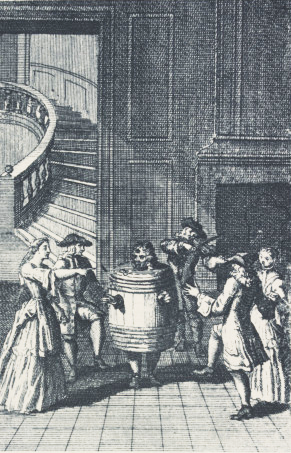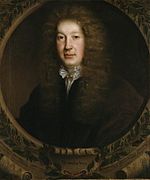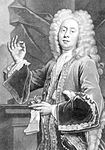
Restoration comedy is English comedy written and performed in the Restoration period of 1660–1710. Comedy of manners is used as a synonym for this. After public stage performances were banned for 18 years by the Puritan regime, reopening of the theatres in 1660 marked a renaissance of English drama. Sexually explicit language was encouraged by King Charles II (1660–1685) personally and by the rakish style of his court. Historian George Norman Clark argues:
The best-known fact about the Restoration drama is that it is immoral. The dramatists did not criticize the accepted morality about gambling, drink, love, and pleasure generally, or try, like the dramatists of our own time, to work out their own view of character and conduct. What they did was, according to their respective inclinations, to mock at all restraints. Some were gross, others delicately improper.... The dramatists did not merely say anything they liked: they also intended to glory in it and to shock those who did not like it.
Charles Hart was a prominent British Restoration actor.
Epicœne, or The Silent Woman, also known as Epicene, is a comedy by Renaissance playwright Ben Jonson. The play is about a man named Dauphine, who creates a scheme to get his inheritance from his uncle Morose. The plan involves setting Morose up to marry Epicoene, a boy disguised as a woman. It was originally performed by the Blackfriars Children, or Children of the Queen's Revels, a group of boy players, in 1609. Excluding its two prologues, the play is written entirely in prose.
Sir Martin Mar-all, or The Feign'd Innocence is an English Restoration comedy, first performed on 15 August 1667. Written by John Dryden and based on a translation of L'Étourdi by Molière, it was one of Dryden's earliest comedies, and also one of the greatest theatrical successes of his career.

The Duke's Company was a theatre company chartered by King Charles II at the start of the Restoration era, 1660. Sir William Davenant was manager of the company under the patronage of Prince James, Duke of York. During that period, theatres began to flourish again after they had been closed from the restrictions throughout the English Civil War and the Interregnum. The Duke's Company existed from 1660 to 1682, when it merged with the King's Company to form the United Company.

The Assignation, or Love in a Nunnery is a Restoration comedy written by John Dryden. The play was first acted late in 1672, by the King's Company at their theatre at Lincoln's Inn Fields, but was not a success with its audience.
The Mulberry-Garden is a comedy by Restoration poet and playwright Sir Charles Sedley (1639–1701) and was published in 1668
The False Count, Or, A New Way to play An Old Game is a comedic play written by Aphra Behn, first performed in 1681 and published in 1682. It was staged by the Duke's Company at the Dorset Garden Theatre in London. The cast included William Smith as Don Carlos, James Nokes as Francisco, John Freeman as Sebastian, John Wiltshire as Antonio, George Bright as Baltazer, Cave Underhill as Guzman, Anthony Leigh as Guilion, Elizabeth Currer as Isabella and Margaret Osborne as Jacinta.
The Adventures of Five Hours is a 1663 comedy play by the English writer Sir Samuel Tuke, 1st Baronet. Based on the play Los empenos de seis horas by Antonio Coello, It is an early example of the developing Restoration comedy tradition. Its success led to a series of sentimental plays in the Spanish style about love and honour, very different to the more sophisticated and cynical comedies which the Restoration era became known for.

Love Makes A Man; Or, The Fop's Fortune is a comedy play by the English writer Colley Cibber written and first performed in 1700, and first published in 1701. It borrows elements from two Jacobean plays The Elder Brother and The Custom of the Country by John Fletcher.

Henry Harris was an English stage actor and theatre manager. Initially a painter he was a founder member of the new Duke's Company in 1660 following the Restoration which established itself at the old Salisbury Court Theatre before moving to the new Lincoln's Inn Fields Theatre shortly afterwards. Due to his background Harris may have been a set designer and painter during his early years with the company. However, by 1661 he was acting, and his first recorded role was in William Davenant's The Siege of Rhodes that summer. He quickly established himself as the second actor in the troupe after Thomas Betterton.

The Comical Revenge; Or, Love In A Tub is a 1664 comedy play by the English writer George Etherege. First staged by the Duke's Company, it premiered at the Lincoln's Inn Fields Theatre. It is one of the earliest Restoration Comedies. The play holds importance for the literary historian for Etherege's employment of two separate language styles. The style employed in the verbal sparring between Sir Frederick and the Widow would set the standard for the language of the Restoration comedy. The subtitle refers to the comical subplot which deals with the locking up of Dufoy, servant of Sir Frederick, in a tub by the chambermaids Betty and Lettice.
John Crosby was an English stage actor of the Restoration Period. He first recorded performance is in 1662 when he appeared in Ignoramus at Whitehall Palace, likely as a child actor. It was further eight years before he was solidly established in the Duke's Company in 1670 beginning with The Forc'd Marriage by Aphra Behn. He became a regular with the company over the following decade, often playing young lover roles. He retired from the stage in 1679 and later became a justice of the peace for Middlesex. He died on 8 April 1724 and was buried in St Sepulchre.

A True Widow is a 1678 comedy play by the English writer Thomas Shadwell. It was first staged by the Duke's Company at the Dorset Garden Theatre in London. The names of the original cast are unknown. The prologue was written by Shadwell's colleague John Dryden. It was published the following year and dedicated to Charles Sedley.

Bury Fair is a 1689 comedy play by the English writer Thomas Shadwell. It is part of the tradition of Restoration Comedy that flourished during the era. It was first staged by the United Company at the Theatre Royal, Drury Lane in London.
The Disappointment; Or, The Mother In Fashion is a 1684 comedy play by the Irish writer Thomas Southerne. It was first performed by the United Company at the Theatre Royal, Drury Lane. The prologue was written by John Dryden.

Love Triumphant; Or, Nature Will Prevail is a 1694 tragicomedy by the English writer John Dryden. It was Dryden's final stage play.

Love in a Wood; Or, St James's Park is a 1671 comedy play by the English writer William Wycherley. His debut play, it was first staged at the Theatre Royal, Drury Lane by the King's Company.
Edward Lydall was an English stage actor of the seventeenth century. He was a member of the King's Company at the Theatre Royal, Drury Lane. His first known performance was in 1668. He generally played supporting roles. His surname is sometimes written as Lidell.

The Lying Lover; Or, The Lady's Friendship is a 1703 comedy play by the Irish writer Richard Steele. It was his second play, written while he was an army office doing garrison duty in Harwich during the War of the Spanish Succession. It is described as being both a restoration comedy and a sentimental comedy, and marked the transition between the two.













